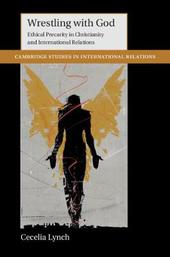
|
Wrestling with God: Ethical Precarity in Christianity and International Relations
Hardback
Main Details
Description
Contrary to charges of religious "dogma," Christian actors in international politics often wrestle with the lack of a clear path in determining what to do and how to act, especially in situations of violence and when encountering otherness. Lynch argues that it is crucial to recognise the ethical precarity of decision-making and acting. This book contextualizes and examines ethical struggles and justifications that key figures and movements gave during the early modern period of missionary activity in the Americas; in the interwar debates about how to act vis-a-vis fascism, economic oppression and colonialism in a "secular" world; in liberation theology's debates about the use of violence against oppression and bloodshed; and in contemporary Christian humanitarian negotiations of religious pluralism and challenges to the assumptions of western Christianity. Lynch explores how the wrestling with God that took place in each of these periods reveals ethical tensions that continue to impact both Christianity and international relations.
Author Biography
Cecelia Lynch is a professor of political science at the University of California, Irvine. Her book Beyond Appeasement (1999) won the Myrna Bernath Book Prize and the Edgar Furniss Book Prize. She is the recipient of the J. Ann Tickner Award (2014) and was recognised as the International Political Sociology Distinguished Scholar (2019), both awarded by ISA.
Reviews'Cecelia Lynch offers a brilliant rejoinder to those too quick to cast aside Christian ethics. The book offers an unflinching look at the promises and problems of the international order ... structured around profound queries of modern political events from war to humanitarianism. It is necessary reading for anyone wrestling with questions of public morality the place of spirituality in the exercise of liberty, freedom, and the responsibility to self and others.' Siba N. Grovogui, Professor of Political Science and International Relations, Cornell University 'A beautifully written, deeply thoughtful exploration of the debates within Christian ethics. Lynch engages with a broad array of scholars, and combines richly historical research with contemporary examples, to identify the fraught legacies of Christian ethics in international politics, offering an original analysis of the ethical debates with which we still wrestle.' Helen M. Kinsella, Department of Political Science, University of Minnesota, Twin Cities 'Lynch's richly nuanced account illuminates the precarious and yet enduringly central role of western Christian ethical reasoning and practice in the construction of modernity and, specifically, in the shaping of international relations through the assertion of Western military, economic and religious power. Throughout, Lynch refuses to resort to simple binaries of religion and secular, official and popular, pure and compromised. The erudition and care with which she has crafted this story ensures that the crucial mediating role of Christian ethical reasoning, for all its vagaries and unintended outcomes in application, will no longer be overlooked in treatments of the consequences of modernity.' R. Scott Appleby, Professor of History and Marilyn Keough Dean, Keough School of Global Affairs, University of Notre Dame 'This book has a number of virtues, one of them being the author's ability to weave together insights from different fields of study, especially political science and religion, through primarily ethical reflections.' F. G. Kirkpatrick, Choice
|